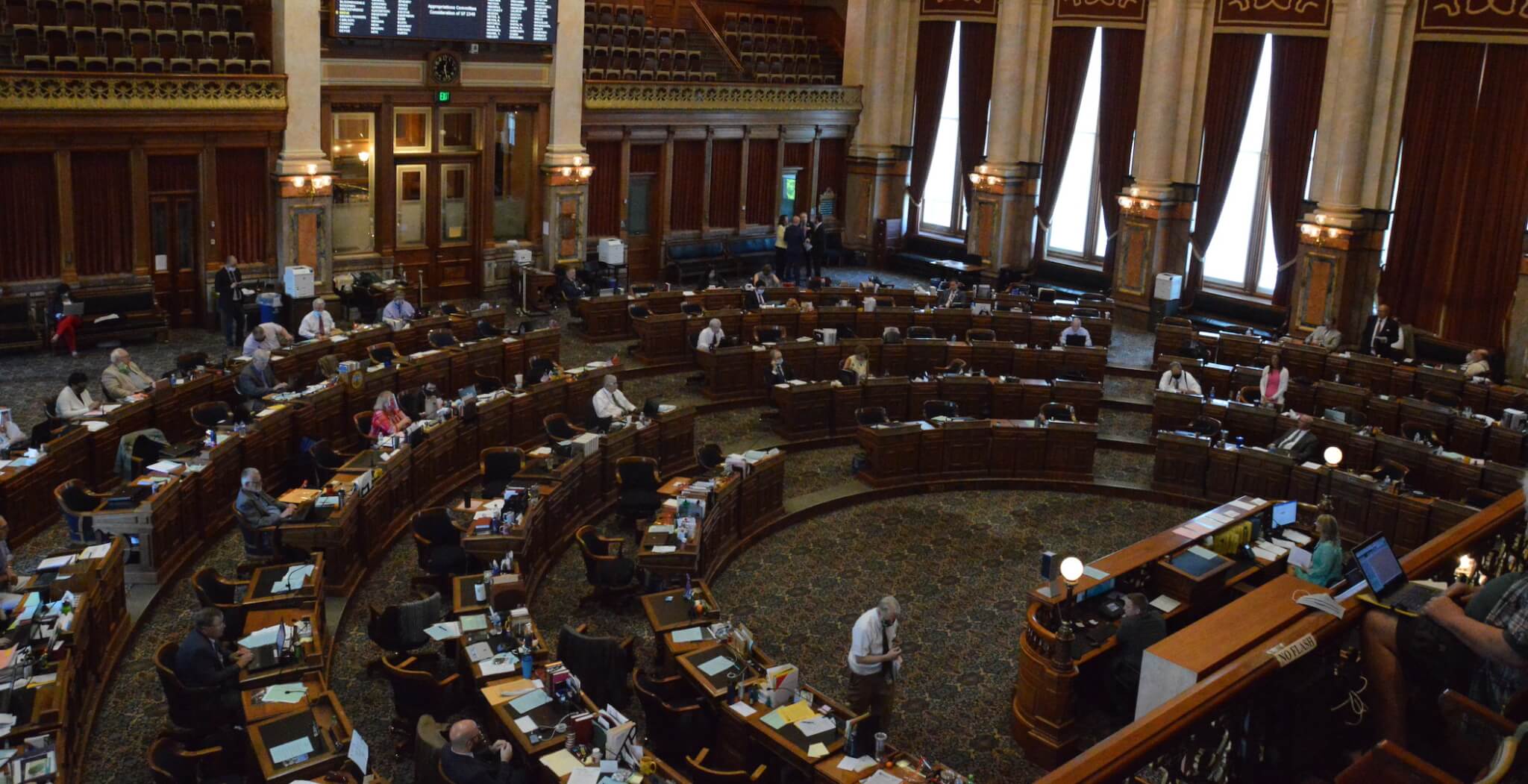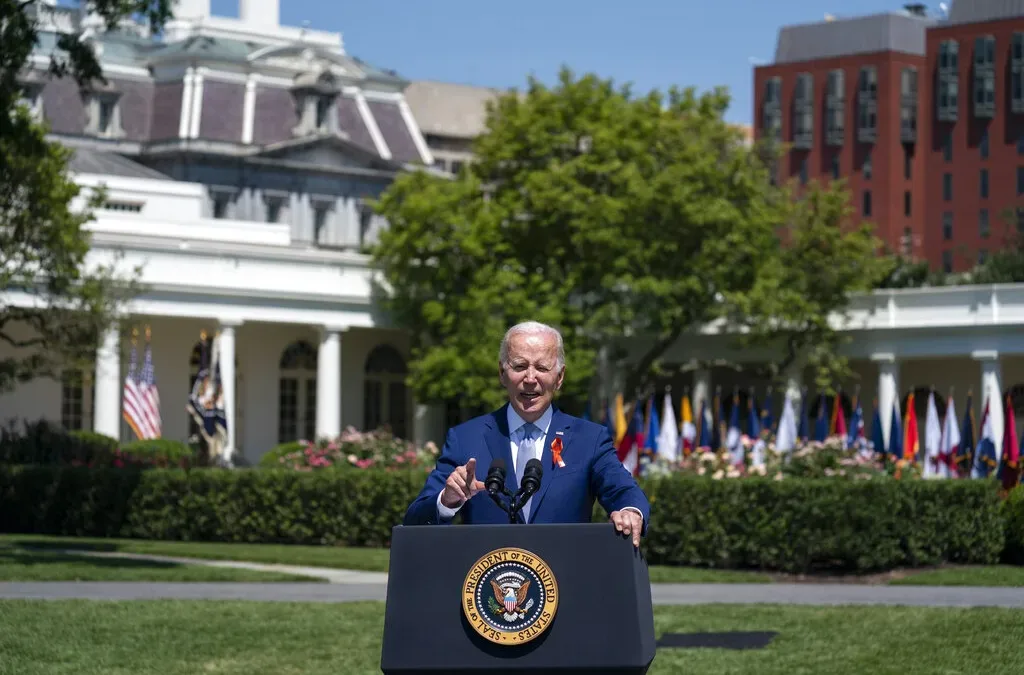
George Floyd’s name was mentioned frequently around Iowa’s capitol building Wednesday night, along with cries for racial equity across the state.
Hundreds have taken to the streets of Des Moines throughout the past week — sometimes in front of the Statehouse — protesting the murder of Floyd by police in Minneapolis. They’ve called for a wide range of racial justice measures, including an end to Iowa’s practice of barring former felons from voting.
While activists urge Gov. Kim Reynolds to issue an executive order that would restore those voting rights (Iowa is the only U.S. state that permanently bans voting for those convicted of a felony — only the governor can individually restore that right for those who apply), the Republican-run Legislature was already working on the matter this session. Both a bill and a constitutional amendment are working their way through the Statehouse.
Details of the Republicans’ legislation has drawn sharp criticism from their Democratic colleagues, as it would still bar any former felons from regaining the right to vote if they owe any form of restitution to a victim of their past crime.
Democratic Representatives called the legislation a “new poll tax,” with its restrictions.
[inline-ad id=”1″]
“We are creating a poll tax. You may not want to call it that, but it is a poll tax nonetheless,” Rep. Heather Matson, D-Ankeny, said. “It’s astounding to me that we would move a bill that is this tone-deaf to this moment.”
A bill establishing those restrictions was signed into law on Thursday by Reynolds and would go into effect if the Senate ratifies a constitutional amendment that the House pushed forward last year. The Senate is slated to debate the amendment today, and it would then be voted upon by Iowans to go into effect.
House Republicans said the new legislation was a step forward, as it would override a law that requires all felons to apply to the governor to get their restored voting rights. At a press conference Thursday morning, Republican Gov. Kim Reynolds praised the House for passing the bill. Reynolds has before resisted calls to enact an executive order that would automatically restore felon voting rights like some of her predecessors, instead requesting lawmakers pass an amendment to accomplish the task.
Other Democratic representatives called the bill “alarmingly discriminatory” and that it perpetuates disenfranchisement of the black community.
“In my opinion, this bill is another knee on a black man,” said Rep. Charles Isenhart, D-Dubuque.
[inline-ad id=”2″]
These claims were then disputed by Rep. Bobby Kaufmann, R-Wilton, one of the authors of the bill.
“I heard the word, pay-for-play, and poll tax repeatedly. It’s a good political catchphrase. It’s not accurate. You can say it over and over and over again. But the courts simply disagree with you,” said Kauffman in his closing statement.
Deliberation over the legislation, as well as bills about medical cannabis, weapons and firearms while the Legislature resumed session this week offered up times when Democratic lawmakers from both chambers took the opportunity to push for racial equity.
The debate became heated several times, especially during discussion of medical cannabis in the Senate before passing. The bill would allow Iowans in the medical cannabis program to buy a maximum of four-and-a-half grams of THC per 90-day supply. This threshold follows the recommendations of a state task force, but Senate Democrats say it is much too strict and impacts black and brown communities.
“Iowa’s marijuana laws are our Jim Crow laws. They target black and brown people,” Sen. Joe Bolkcom, D-Iowa City, said. “I happen to believe this is a punitive policy that impacts people that are scrambling to make a living, scrambling to put food on the table. They don’t go to jail, you just put them in poverty. It’s cruel… These kinds of policies are bad for us. This is why people are protesting.”
[inline-ad id=”3″]
Republicans rejected the notion that the bill would disproportionately affect minority communities.
“The question was asked, Why are people protesting? You have made it about racial division. And that is an attack on me because you attacked me,” said Sen. Brad Zaun, R-Des Moines, one of the authors of the bill. “People are protesting because they are not being heard and they haven’t been heard for years. What happened in Minneapolis disgusts me. I hope that guy rots in hell. And it happens way too much… That’s not what this bill is.”
The Iowa Senate also passed a bill Wednesday that prevents local firearm accessory ordinances from being stricter than state law. The bill would also require public buildings to provide armed security and screening if local governments ban weapons.
“Iowa Firearms Coalition and our allies in the NRA are celebrating a great victory today in our years-long battle to prevent an unworkable patchwork of weapons regulations across our state. Iowans deserve – and have been insisting upon – minimal, uniform and understandable regulation throughout the state,” The Iowa Firearms Coalition wrote in a statement.
[inline-ad id=”0″]
Sen. Zach Wahls, D-Coralville, urged lawmakers to watch the video of George Floyd’s death while he proposed an amendment that would require Iowa police to have as much de-escalation training as they do firearms training.
On Thursday, lawmakers also introduced their “plan for a more perfect union” in front of the statehouse, which includes three steps to address policing.
[signup_form]
The legislators plan on adding to the proposal, which includes a ban on police choke-holds, making it illegal to rehire police fired for misconduct and allowing the Attorney General to investigate police misconduct, as an amendment to another bill before adjournment of the 2020 legislative session.
“George Floyd was murdered in Minneapolis, but it could have easily been a man in Mason City, Dubuque, Davenport, or Council Bluffs. Like many other states, Iowa doesn’t have appropriate legislation to protect our people,” said Rep. Ras Smith, D-Waterloo. “While no one law can end racism or end the inequality that we face overnight, we must begin to respond to this crisis, to bring justice to George Floyd, and work towards a day where no Iowan has to live in fear of becoming another hashtag.”
by Isabella Murray
Posted 6/4/20
Iowa Starting Line is an independently-owned progressive news outlet devoted to providing unique, insightful coverage on Iowa news and politics. We need reader support to continue operating — please donate here. Follow us on Twitter and Facebook for more coverage.
Politics

Biden announces new action to address gun sale loopholes
The Biden administration on Thursday announced new action to crack down on the sale of firearms without background checks and prevent the illegal...

Biden cancels student loan debt for 2,690 more Iowans
The Biden administration on Friday announced its cancellation of an additional $7.4 billion in student debt for 277,000 borrowers, including 2,690...
Local News

No more Kum & Go? New owner Maverik of Utah retiring famous brand
Will Kum & Go have come and gone by next year? One new report claims that's the plan by the store's new owners. The Iowa-based convenience store...

Here’s a recap of the biggest headlines Iowa celebs made In 2023
For these famous Iowans, 2023 was a year of controversy, career highlights, and full-circle moments. Here’s how 2023 went for the following Iowans:...




